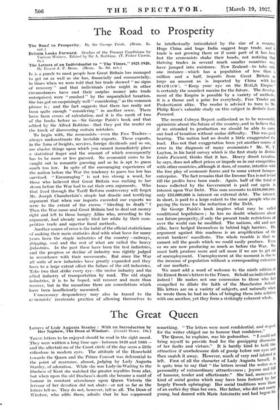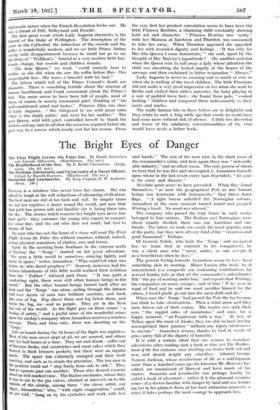The Great Queen
Letters of Lady Augusta Stanley : With an Introduction by Her Nephew, The Dean of Windsor. (Gerald Howe. - 18s.) THESE letters to be enjoyed should be read in the right mood. They were written a long time ago:--between 1849 and 1868— and the affectations of the Court circle of the day seem- a little ridiculous in modern eyes. The attitude of the Household towards the Queen and the Prince Consort was deferential to the point of reverence, almost, judging by Lady Augusta Stanley, of adoration. While she was Lady-in-Waiting to the Duchess of Kent she watched the greater 'royalties from afar, but when upon the old Duchess's death she became a maid of honour in constant attendance upon Queen Victoria' the fervour of her devotion did not abatt —or not so far as the letters tell us. They do not, however, tell us all. The Dean of Windsor, who edits them, admits that he has soppressed
something. " The letters were most confidential, and respect for the writer obliged me to honour that Confidence."
The Queen, he explains, was his godmother. " I could not bring myself to provide food for the gossipping discussion of her faults and virtues." It is hardly kind to hold thk attractive if unwholesome dish of gossiP before our eyes and then snatch it away. HoweVer, much of very real interest is left. First of all the character of Lady Angusta herself. It is. quite true to say that " the letters reveal the writer as a perSonality of extraordinary attractiveness ; joyous and full of humour, tender and affectionate." She had, moreover, a kind of social genius which may have been fostered by her largely French upbringing: Her social traditions were those of an earlier day than hei own. Her father, who did not marl,' young, had danced with Marie Antoinette and had begun his diplomatic career when the French Revolution broke out. He Aras a friend of Pitt, Talleyrand and Fouche.
The first great event which Lady Augusta chronicles is the funeral of the Duke of Wellington. The description of the scene in the Cathedral, the behaviour of the crowds and the police is wonderfully modern, and we see little Prince Arthur crying with disappointment because he could not go to sec the Duke of " Wellikon's " funeral as a very modern little boy. Courts change, but crowds and children remain.
The dear Queen." we read, " could scarcely bear to realize, as she did when she saw the coffin before Her—Her unspeakable loss—She wears a bracelet with his hair." • The letters which tell of the Prince Consort's death are dramatic. There is something terrible about the mixture of human heartbreak and Court ceremonial about the Prince's bed. The room seems to have been full of people, most of them, of course, in merely ceremonial grief, thinking of " his well-conditioned mind and tastes." Princess Alice was close to Lady Augusta. " She whispered to me with great calm `that is the death rattle,' and went for her mother." The poor Queen, wild with grief, . controlled herself to thank the doctors and say and do all that the occasion required before she rave way to a sorrow which nearly cost her her reason. From
the very first her greatest consolation seems to have been the little Princess Beatrice, a 'charming child constantly showing both wit and character. " Princess Beatrice was notty ' with her Mamma at luncheon and Thurston was summoned to take- her away. When Thurston appeared she appealed to her with wounded dignity and feelings. ' It was only for Her (the Queen) I came downstairs,' " she said, upset by the thought of Her Majesty's ingratitude ! On another occasion when the Queen sent to call away a lady whose attention the child was absorbing she looked angrily at the bearer of the message and then exclaimed in bitter resignation " Always."
Lady Augusta is never so amusing and so much at ease as when she is writing of the royal children. The little Prussians did not make a very good impression on her when she went to Berlin and visited their airless nurseries, the baby playing in a sort of padded loose box ; she found them pale, " cooked looking " children and compared them unfavourably to their aunts and uncles.
The really human bits in these letters are so delightful and they relate to such a long while ago that surely we could have had some more without risk of offence. A little less discretion and fewer of the adulatory conventionalities of the time would have made a better book.































































 Previous page
Previous page